A Look Into the Workshop
= Mandonator™ Serial #12 ===
This instrument was commissioned by Alan S.
The options he chose are:
- Four strings with standard 13.875" mandolin scale
- Canarywood body with canarywood binding
- No cutaway
- Two round, ebony-lined soundholes
- Canarywood neck
- Ebony fingerboard with gold MoP position marker dots
- Snakehead shape headstock with ebony veneer
- Custom headstock inlay
- Black tailpiece and Gayle design resonator coverplate
- Gold Steinberger gearless tuners
Standard features include:
- Spherically arched back
- Radiused fingerboard
- Spider bridge and resonator cone
- Maple saddle and bone nut
- Glossy lacquer finish
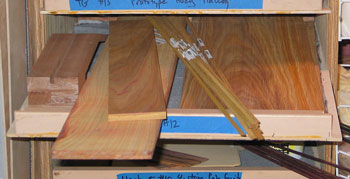
The canarywood for the body, fingerboard, and binding has arrived, and is waiting with a neck blank on the dedicated shelf drawer for Mandonator™ 12. Before the wood can be used, it will be stickered (stacked to allow air maximum access to all sides) until the moisture content of the wood has reached equilibrium. Then I'll sand it to the proper thicknesses
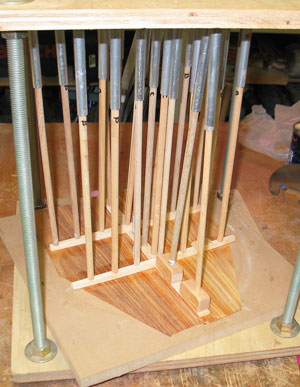
The back of the instrument is having its braces installed, using a go-bar deck to clamp the braces to the back. The braces are arched to match the arch in the back and will help maintain the arch as well as strengthen the back.
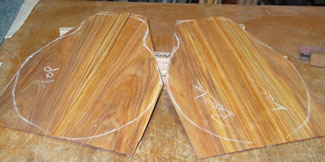
The bookmatched and joined top and back. That canarywood is certainly striking!
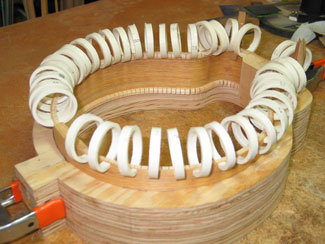
The lining is being glued to the top edge of the sides, and is clamped with O-rings made from PVC. The sides are held in a form to help maintain their shape.
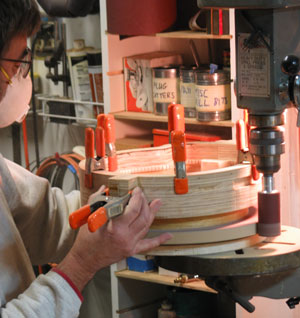
Sanding the rims flat and clean in preparation for attaching the top.
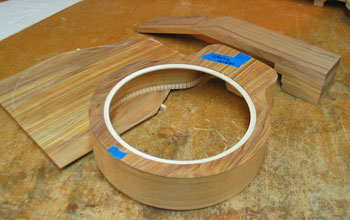
All canarywood: top and sides, back, neck blank. Blue tape notes soundhole type and centerline. The soundholes will be cut, then the back attached. The neck blank is ready and can be worked separately for now.
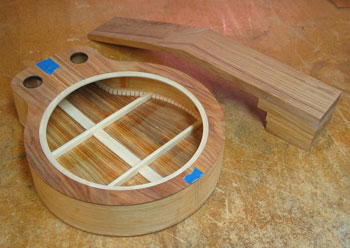
I always enjoy this stage of construction. The body is really starting to look like a Mandonator™! It still needs binding, and I'll start working on the neck and neck joint.
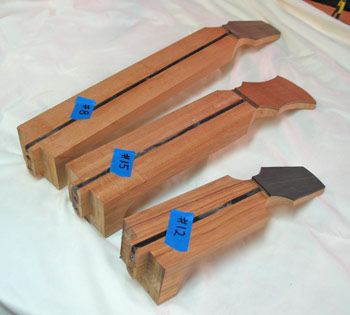
These are the necks, in progress, for instruments 8, 12, and 15. I've installed the graphite truss rods, created the tenons for the body joint, and attached the headstock veneers. The head and heel shapes have been roughed in. Meanwhile, I've been slotting the fretboards for these necks. Next in the process is to inlay the headstocks and fretboards. After that, I'll complete the fretboard shaping, install frets, and prepare to attach them to the necks.
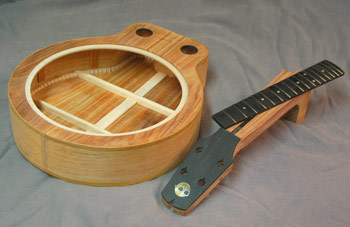
If you look closely, you can see the canarywood binding on the canarywood body. I've done the inlay on the headstock, and the fingerboard is ready to install.
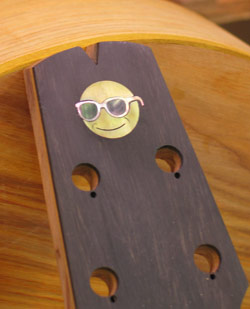
Here's a closer look at that inlay on the headstock. That's right -- a smiley sun with sunglasses!
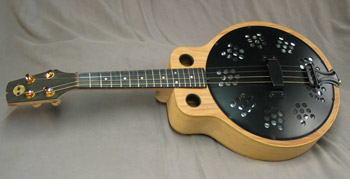
Here's Alan's Mandonator™, fully assembled, but still "in the white." I'll be taking it to Addam Stark to apply a lacquer finish. As usual, it has that lovely Mandonator™ tone. The coverplate is one of my own design, powder-coated black.
Mandonator™ 12 has been completed! You can see photos of the finished instrument on its Gallery page.